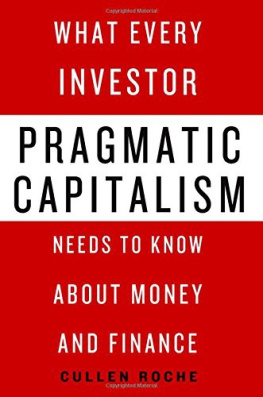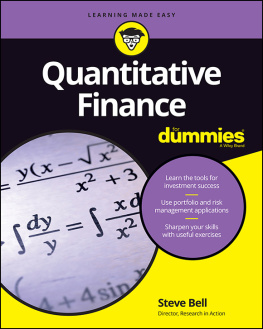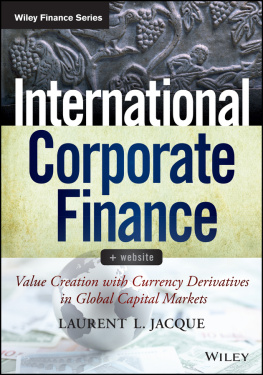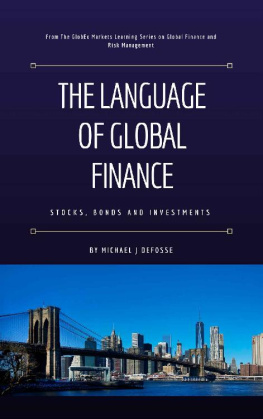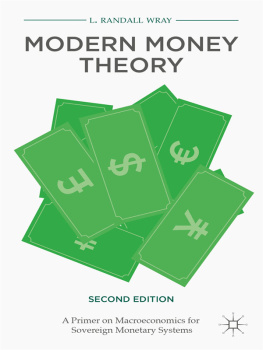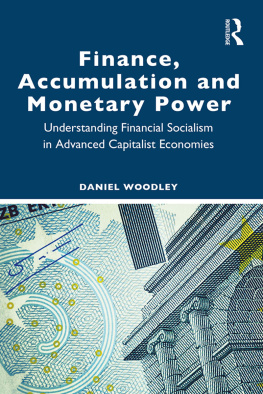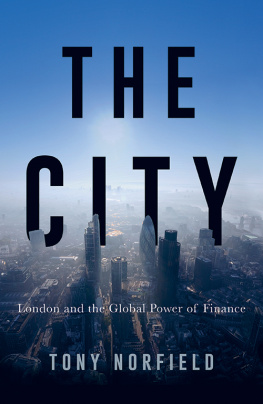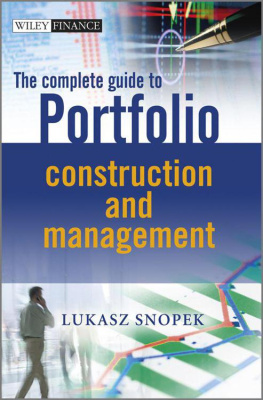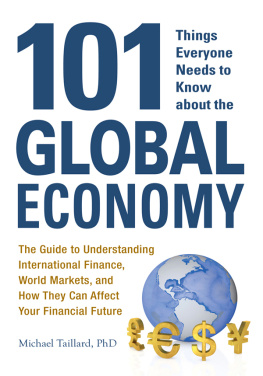Pragmatic Capitalism
Pragmatic Capitalism
What Every Investor Needs to Know About Money and Finance
Cullen Roche

The author and publisher have provided this e-book to you for your personal use only. You may not make this e-book publicly available in any way. Copyright infringement is against the law. If you believe the copy of this e-book you are reading infringes on the authors copyright, please notify the publisher at: us.macmillanusa.com/piracy.
Contents
Acknowledgments
This book is the result of decades of personal development and learning that I could have never achieved entirely on my own. A great number of people have helped me develop the understandings and personal knowledge that made this book possible.
First and foremost, I want to thank everyone at Palgrave Macmillan who made my idea for the book a reality. In particular, I want to thank Laurie Harting, whose tireless editing and coaching helped make my writing intelligible.
To the many colleagues in the field of finance and economicsmy understanding of the financial world would be far more deficient were it not for my interactions with Jeff Howlett, Brett Fiebiger, Mike Sankowski, Carlos Mucha, Michael Peckham, James Montier, Ramanan V, Warren Mosler, Marc Lavoie, Josh Brown, Meb Faber, John Carney, and many others involved in the world of finance and economics.
To the many friends and readers at the Pragmatic Capitalism websitethank you for always pushing my learning curve and helping me develop an environment of learning and improvement.
To my seven best friends in the world, my brothers and sistersthank you for never being too upset with me for being better looking than you. And thank you for always being there for me, no matter what. I wouldnt be half the person I am without you (although that half would still be better looking than you).
To my dog, Callie, who might benefit from this book more than anyone (she very much enjoys eating paper)thank you for always reminding me that every day is the best day to be alive.
To my mom and dadI definitely won the amazing parents lottery. How could I have possibly asked for more love and support through the years?
And to Ericayou are everything to me. Every day I wake up the wealthiest man in the world.
What I Hope to Accomplish
The global financial system is undergoing a seismic shift as I write. What was once a localized and domestic system is quickly being transformed into a complex, interconnected, and interdependent global macroeconomic system. This transformation is changing the way we do everythingfrom the way we transact with one another, to the way we invest, to the way governments implement policy.
Although the global financial system is rapidly evolving and becoming increasingly complex, most of its participants remain woefully ill equipped to navigate this system. According to a 2012 study by the Securities and Exchange Commission:
U.S. retail investors lack basic financial literacy... have a weak grasp of elementary financial concepts and lack critical knowledge of ways to avoid investment fraud.
The good news is that we have the tools needed to better understand and adapt to this changing macroeconomic monetary system. To be better prepared to benefit from this system, we have to want to learn about it.
Pragmatic Capitalism is a series of principles and understandings intended to piece together the puzzle of the global financial system so you can be better prepared to invest, save, and participate within this rapidly evolving system. The text covers a substantial amount of ground and as a result it will read much like many separate sections each with their own important principles. It is my hope that this book will provide you with a superior understanding of the world of money, finance, and economics so you can prepare for the new macroeconomic world and better navigate your path to financial success.
Chapter 1
What Is Money?
The person who mistakes money for wealth will live a life accumulating things, all the while mistaking a life of owning for a life of living.
If you pick up a finance or economics book these days, you will rarely find a thorough explanation of what money is. In fact most modern economists do not even agree on a set definition of money, and many do not include money in their models of the economy. Of course we all have a vague concept of money, but do any of us truly understand what it really is? I think that any book about finance and economics is incomplete if it does not begin by explaining what money is. After all, how can you understand the economy if you dont understand the primary tool with which we interact in that economy? A finance or economics book without an understanding of money is like a car manual that lacks an explanation of how to refuel your car. Even worse, it is like a car manual that doesnt even tell you what type of fuel your car should use. Unfortunately money is a far more dangerous construct than fuel so it would be imprudent to write a book about money that does not first explain what it is.
From an economic and financial perspective understanding precisely what money is and how it influences the economy is crucial. Why? Because money is the most important tool we use in modern life. Money is at the heart of every financial transaction, including our calculations of output, profits, and every measurement of our financial health. Understanding how this tool works is central not only to understanding how the monetary system and the economy works but to understanding modern human life.
Why Do We Use Money?
Before we can say what money is, its helpful to understand first why money even exists. To answer that question, and really begin to understand money and the history of money, it might help to understand the most basic purpose that money serves. As highly socialized and intelligent animals, we humans have created various tools that improve our ability to trade and interact. A barter system is relatively primitive and insufficient because it forces you to be able to obtain something that someone else will want in exchange for the things you might need. Creating a universal medium of exchange is the bind that ties all goods and services together by making all goods and services exchangeable. At its core money is simply a social construct that allows for the exchange of goods and services.
Money, within a modern human society, is highly evolved, formal, and even institutionalized. The true history of money is lost in time, but its likely that money started in the form of unspoken promises, evolved through a barter system of some type, and has expanded over time into formal promises and legal contracts. Today most money is defined and protected by laws. Modern money has evolved primarily into the electronic records of account.
We live in a highly advanced and sophisticated economic system that is predicated on the social interaction of trading goods and services for money. Said differently, money is the medium by which we gain access to the things we desire. You cant always trade a back scratch for a back scratch, but humans have resolved that issue by creating something that facilitates the exchange of most goods and services. For instance, if I want a back scratch, but I dont want to scratch your back, its not a problem. Instead you scratch my back in exchange for $10, thereby voiding my need to provide you with an equivalent back scratch, and you can go buy whatever you want.
At its most basic level money is just a tool that is created to facilitate exchanges among highly socialized animalsa social tool that acts as an intermediary in transactions. So now we can arrive at our first understanding of money:
Next page
